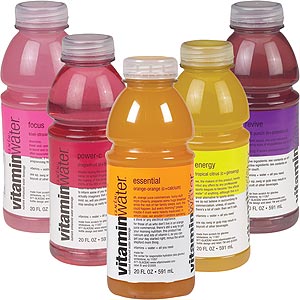Yesterday I read an article in the Vancouver Sun about how Health Canada is questioning Vitaminwater’s health claims. Apparently the product is filled with sugar and uses misleading marketing messages in its advertising and packaging like “defence,” “multi-v,” and “restore” and “nutrition enhanced water beverage” that lead consumers to believe the product is a healthier beverage option than it actually is.
 Critics say Vitaminwater is basically coloured sugar water with a few cents worth of synthetic vitamins that is marketed as a beneficial alternative to sugary soft drinks. (FYI: Sugar is indeed one of the main ingredients. A 591 ml bottle of vitaminwater has 32 grams of sugar, compared to 42 grams of sugar in a 355 ml can of Coke and 38 grams of sugar in Sprite.)
Critics say Vitaminwater is basically coloured sugar water with a few cents worth of synthetic vitamins that is marketed as a beneficial alternative to sugary soft drinks. (FYI: Sugar is indeed one of the main ingredients. A 591 ml bottle of vitaminwater has 32 grams of sugar, compared to 42 grams of sugar in a 355 ml can of Coke and 38 grams of sugar in Sprite.)
Coke is defending itself by claiming that “no consumer could reasonably be misled into thinking Vitaminwater was a healthy beverage.” Surely, they said, people read the fine print on the label to see that sugar is the #2 ingredient. The company attempted to have a class action suit filed against them dismissed but it was denied by a U.S. judge and the case is proceeding.
Incidentally some folks at Health Canada were asleep at the wheel and granted product licenses to Vitaminwater for various flavours a while back, along with accompanying product claims about how the beverage helps to keep people healthy. It now has concerns and is re-thinking this approval. (Obesity in Canada is a growing health concern with health officials stating that it is one of the leading causes of preventable deaths so it makes sense for them to encourage healthy diets.)
While I commend Coca Cola for pursuing product innovation, I am surprised by the audacity of Coca Cola to advertise this product as a healthy way to meet one’s nutritional needs and then later deny that they were trying to deceive or mislead.
Aside from Coke’s deception and our health regulator’s obvious gaffe in allowing this ‘liquid candy’ to promote unsubstantiated product marketing messages, what can we learn from this issue?
1. Be honest and transparent. If you’re selling a sugary drink, don’t sugarcoat it with distracting messages about vitamins and nutrition. Just say what it is for heaven’s sake and stop trying to be something you’re not. Remember Jolt Cola? It’s original slogan was: “All the sugar and twice the caffeine.” You may not like Jolt Cola but you’ve gotta love the brand for being open and honest.
2. Be prepared to substantiate your claims. If you are launching a health product, solicit credible third party endorsements, product reviews and testimonials from relevant experts. I work with a food company that sells sustainable seafood, for example, and the company’s products have been positively reviewed by a well-known nutritionist, a respected sustainable seafood industry authority and a leading environmental organization. These endorsements provide credibility and go a long way with customers who seek more information.
3. Be wary when someone says: “Can you put a spin on my product”. A red flag should go up in your head when you hear a potential client say, “Great you’re in PR, can you put your spin on my ABC product and get it in the news? My product is so great, I really think more people should know about it.” (Spin is a word that I loathe as it’s often considered a pejorative term that implies a biased and disingenuous portrayal of situation that favours a specific person, organization, brand or event.)
My first response is to offer an explanation of what real public relations is: Public relations is the practice of creating mutually beneficial relationships between an organization and its stakeholders through honest, two-way communication. I emphasize stakeholders because a company’s public relations strategies should take a holistic approach and not just include customers but also employees, partners, investors and any other group that has a stake in the company and vice versa.
Why would I have to put a ‘spin’ on your product or service? It is obvious that you are passionate about the great things your company is doing. If you believe your company makes a great product or provides a great service, why would you need to put spin on that?
4. Don’t use misleading product messages or exaggerate. Vitaminwater is promoted as a liquid medicine that provides “a healthy state of physical and mental well-being”. The company got away with making exaggerated claims for a little while, but the public isn’t stupid and eventually it caught up with them in the form of a class action lawsuit, negative reports and second-guessing health authorities. Was it really worth it? It now seems to be backfiring on the company so I would say ‘no’ although I haven’t looked at their product sales. Nonetheless I still can’t imagine this lawsuit is good publicity for Coke. (The saying, “any publicity being good publicity” is definitely not true.)
5. If you’re thirsty and crave a nutritious beverage, try filtered tap water with a lime wedge and a multi-vitamin instead or herbal tea cooled in the fridge. Not only is it cheaper, but it’s better for you and is better for the environment because it doesn’t come in a plastic bottle! Maria Loscerbo

Mike Desjardins
May 27, 2011 -
It’s amazing that they’ve actually managed to get this far along with this claims. I have to admit that I would never consider Vitaminwater in the same class as a softdrink but except for the carbonation it is! You suggestion of filtered tap water with lime is fantastic. Thank you for the reminder to check the label and think!
breannakatelynn
Oct 22, 2011 -
I find this absolutely amazing that the consumer public is being faced with such misleading product. The title alone “VITAMINwater” implies a certain degree of healthy qualities. It is sad but true that the spin being put on products seems to be spinning out of control. I also greatly enjoyed your PR tips and advice that draw PR professionals back to the lost concepts of honestly and integrity. Success is possible without misleading usages and exaggerations. Thanks again,
Kate
Blog Comments- Professional | Simply PR.
Oct 22, 2011 -
[...] Blog Link [...]
Maria Loscerbo
Oct 22, 2011 -
You’re welcome!
Is Vitamin Water Good For You?
Mar 11, 2012 -
[...] Vitaminwater’s exaggerated claims backfire: PR lessons learned(epicpr.wordpress.com) [...]
click here
Jun 4, 2012 -
Have you given any kind of thought at all with converting your main blog into German? I know a few of translaters right here which would certainly help you do it for no cost if you wanna get in touch with me personally.
Maria Loscerbo
Jun 4, 2012 -
Thanks for your offer to translate my blog! I didn’t know that I had German fans. Let me think about it and get back to you? Thanks.
Let me think about it and get back to you? Thanks.